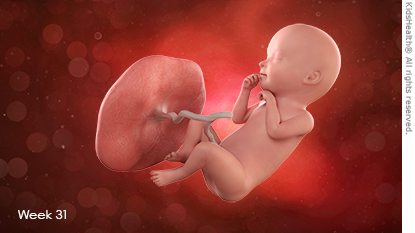Pregnancy Calendar: Week 31
Your Baby's Development
Your baby is peeing several cups of urine a day into the amniotic fluid.  He or she is also swallowing amniotic fluid, which is replaced completely several times a day.
He or she is also swallowing amniotic fluid, which is replaced completely several times a day.
Too much fluid in the amniotic sac (polyhydramnios) could mean that the baby isn't swallowing normally or that there's a gastrointestinal obstruction. Not enough fluid in the amniotic sac (oligohydramnios) could mean that the baby isn't peeing properly, which could indicate a problem with the kidneys or urinary tract. Your health care provider will measure your levels of amniotic fluid as part of your routine ultrasound.

Your Body
 Have you decided whether to breastfeed or formula feed your baby? Experts recommend breast milk as the best form of infant nutrition, but the decision about how to feed your baby is a personal one. Talk to your health care provider or a lactation consultant if you need more information before making your choice.
Have you decided whether to breastfeed or formula feed your baby? Experts recommend breast milk as the best form of infant nutrition, but the decision about how to feed your baby is a personal one. Talk to your health care provider or a lactation consultant if you need more information before making your choice.
The milk glands in your breasts may have started to make colostrum by now. Colostrum is the pre-milk that provides your baby with calories and nutrients for the first few days before your milk comes in (if you plan to breastfeed). For some women, it is thin and watery. For others, it is thick and yellowish. If you notice your breasts leaking colostrum, you can buy disposable or washable breast pads to protect your clothing.
















